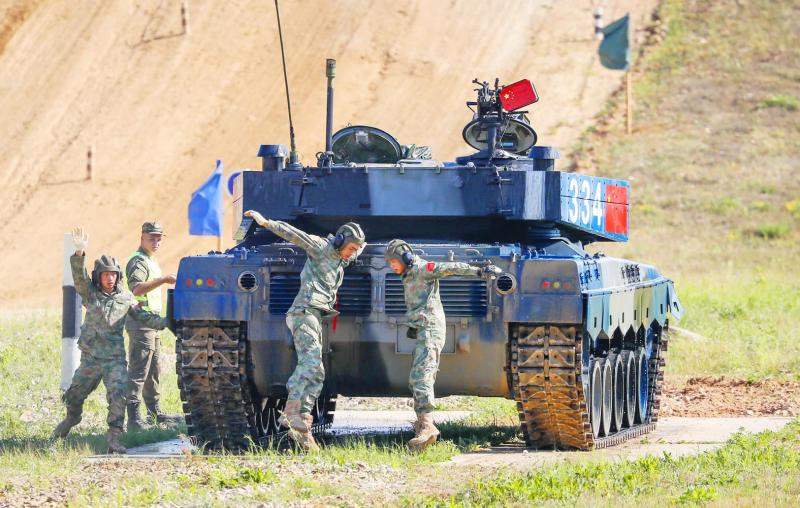Chinese troops are planning to travel to Russia to take part in joint military drills, the Chinese Ministry of National Defense said on Wednesday.
Beijing and Moscow have close defense links, and China has said that it wants to push bilateral relations “to a higher level,” even as Moscow faces international sanctions and widespread condemnation over its war in Ukraine.
The ministry said China’s participation in the annual “Vostok” exercises — which Moscow has said would take place from Saturday to Sept. 5 — is part of a bilateral cooperation agreement with Russia.

Photo: EPA-EFE
“The aim is to deepen practical and friendly cooperation with the armies of participating countries, enhance the level of strategic collaboration among the participating parties and strengthen the ability to respond to various security threats,” the ministry said in a statement.
India, Belarus, Mongolia, Tajikistan and other countries would also participate, it said.
China and India have been accused of providing diplomatic cover for Russia throughout its months-long war in Ukraine by opposing Western sanctions and arms sales to Kyiv.
However, Beijing said its participation in the joint exercises was “unrelated to the current international and regional situation.”
It is the second joint exercise conducted by Chinese and Russian troops this year. Bombers from the countries conducted a 13-hour drill close to Japan and South Korea in May, forcing those countries to scramble fighter jets as US President Joe Biden was visiting Tokyo.
US Department of State spokesperson Ned Price said that while warming ties between China and Russia undermined global security, Washington did not “read anything” into the drills.
“Most of the participating countries also routinely participate in a wide array of military exercises and exchanges with the United States as well,” he told a news conference.

CHAOS: Iranians took to the streets playing celebratory music after reports of Khamenei’s death on Saturday, while mourners also gathered in Tehran yesterday Iranian Supreme Leader Ayatollah Ali Khamenei was killed in a major attack on Iran launched by Israel and the US, throwing the future of the Islamic republic into doubt and raising the risk of regional instability. Iranian state television and the state-run IRNA news agency announced the 86-year-old’s death early yesterday. US President Donald Trump said it gave Iranians their “greatest chance” to “take back” their country. The announcements came after a joint US and Israeli aerial bombardment that targeted Iranian military and governmental sites. Trump said the “heavy and pinpoint bombing” would continue through the week or as long

TRUST: The KMT said it respected the US’ timing and considerations, and hoped it would continue to honor its commitments to helping Taiwan bolster its defenses and deterrence US President Donald Trump is delaying a multibillion-dollar arms sale to Taiwan to ensure his visit to Beijing is successful, a New York Times report said. The weapons sales package has stalled in the US Department of State, the report said, citing US officials it did not identify. The White House has told agencies not to push forward ahead of Trump’s meeting with Chinese President Xi Jinping (習近平), it said. The two last month held a phone call to discuss trade and geopolitical flashpoints ahead of the summit. Xi raised the Taiwan issue and urged the US to handle arms sales to

BIG SPENDERS: Foreign investors bought the most Taiwan equities since 2005, signaling confidence that an AI boom would continue to benefit chipmakers Taiwan Semiconductor Manufacturing Co’s (TSMC, 台積電) market capitalization swelled to US$2 trillion for the first time following a 4.25 percent rally in its American depositary receipts (ADR) overnight, putting the world’s biggest contract chipmaker sixth on the list of the world’s biggest companies by market capitalization, just behind Amazon.com Inc. The site CompaniesMarketcap.com ranked TSMC ahead of Saudi Aramco and Meta Platforms Inc. The Taiwanese company’s ADRs on Tuesday surged to US$385.75 on the New York Stock Exchange, as strong demand for artificial intelligence (AI) applications led to chip supply constraints and boost revenue growth to record-breaking levels. Each TSMC ADR represents

State-run CPC Corp, Taiwan (CPC, 台灣中油) yesterday said that it had confirmed on Saturday night with its liquefied natural gas (LNG) and crude oil suppliers that shipments are proceeding as scheduled and that domestic supplies remain unaffected. The CPC yesterday announced the gasoline and diesel prices will rise by NT$0.2 and NT$0.4 per liter, respectively, starting Monday, citing Middle East tensions and blizzards in the eastern United States. CPC also iterated it has been reducing the proportion of crude oil imports from the Middle East and diversifying its supply sources in the past few years in response to geopolitical risks, expanding